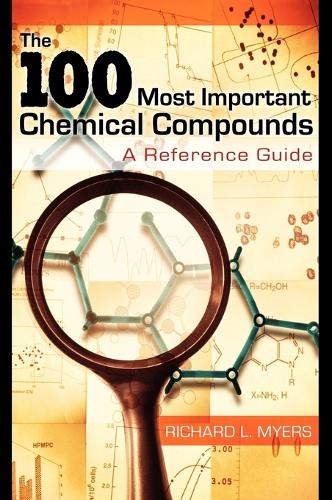
The 100 Most Important Chemical Compounds: A Reference Guide
(Hardback)
Publishing Details
The 100 Most Important Chemical Compounds: A Reference Guide
By (Author) Richard L. Myers
Bloomsbury Publishing PLC
Greenwood Press
30th August 2007
United States
Classifications
Tertiary Education
Non Fiction
Reference works
540
Winner of Outstanding Academic Title 2009 2009
Physical Properties
Hardback
352
Width 178mm, Height 254mm
879g
Description
What is a chemical compound Compounds are substances that are two or more elements combined together chemically in a standard proportion by weight. Compounds are all around us - they include familiar things, such as water, and more esoteric substances, such as triuranium octaoxide, the most commonly occurring natural source for uranium. This reference guide gives us a tour of 100 of the most important, common, unusual, and intriguing compounds known to science. Each entry gives an extensive explanation of the composition, molecular formula, and chemical properties of the compound. In addition, each entry reviews the relevant chemistry, history, and uses of the compound, with discussions of the origin of the compound's name, the discovery or first synthesis of the compound, production statistics, and uses of the compound.
Reviews
Myers offers his criteria for inclusion on his list--compounds that were chosen because of their importance to health, industry, and society, and because of their historical impact. Although one can criticize that alternative compounds have been left off any list such as this, there are a wide variety of compounds represented, including pharmaceuticals, natural products, and commodity chemicals, alongside obvious entries such as water and ammonia. Entries are arranged alphabetically by compound name. Each entry is two to four pages long and includes basic chemical information (Chemical Abstracts Service Registry Number, select physical properties, molecular formula), followed by a narrative discussing the compound's history, significance to society, and general chemistry and use. However, the human side is not forgotten. Roles of many significant scientists, inventors, and companies are detailed in the development and use of these compounds. The book includes a concise yet informative introductory chapter dealing with basic chemistry principles and concepts, as well as a glossary and a table of common and ancient names of substances. Recommended. General readers; lower- and upper-division undergraduates; two-year technical program students. * Choice *
Giving both general and scientific information that might be useful to a variety of users, this is recommended for large public and college/university libraries, especially those serving chemistry departments. * Library Journal *
The 100 Most Important Chemical Compounds is filled with fascinating information. It concludes with a glossary of chemical terms and an extensive bibliography. The author proposes that this book would be especially useful for science teachers and for students needing a general review of common chemical compounds. It is also a wonderful source for persons interested in the history of science. * Association for Women in Science *
The author has included anecdotal information about people, places, and products pertaining to the compound, as well as useful historical information.The clear writing makes this volume accessible to lay readers.A useful addition. * School Library Journal *
[T]he text in The 100 Most Important Chemical Compounds adds another dimension to information about chemicals. This title will be useful for chemistry reference collections in both large and small libraries. * Booklist *
Author Bio
Richard L. Myers is Professor of Environmental Science at Alaska Pacific University. He has taught chemistry, oceanography, meteorology, and physics classes and conducted research on urban environmental issues. His work has appeared in the Journal of Environmental Health,The Northern Engineer, Journal of Chemical Education, and Journal of College Science Teaching. His teaching awards include the Carnegie Foundation Alaska Professor of the Year, Higher Education Award from the United Methodist Church, President's Forum Teaching Award, and Ohaus Award for Innovations in College Science Teaching. teaches undergraduate and graduate courses in chemistry, statistics, and environmental science. Dr. Myers' published research includes work on air quality, water quality, science education, and science and the humanities.
